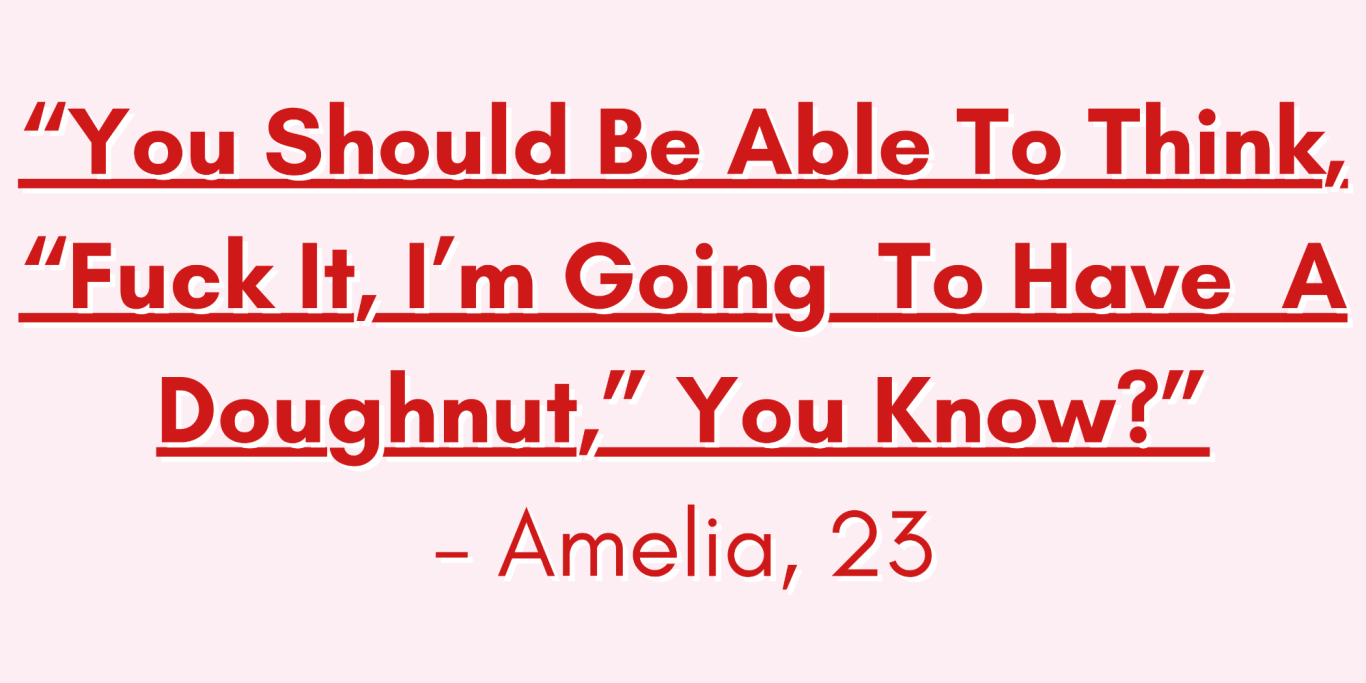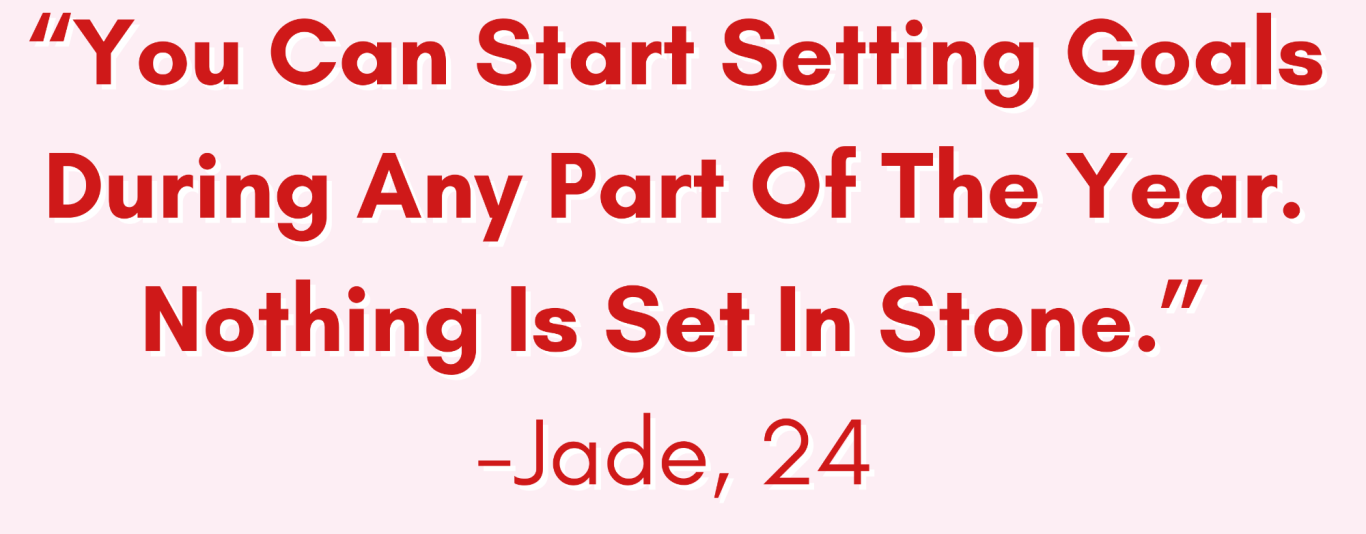
The New Year often feels like the perfect time to begin afresh, with 30 million Britons pledging to set goals for self-improvement in January. Popular resolutions often include weight loss, better budgeting, and sobriety, with many people aspiring to become the healthiest and wealthiest versions of themselves in the New Year.
But how many of us actually stick to our New Year’s Resolutions?
Studies show that around 80% of us abandon our resolutions within the month, leaving us feeling ashamed, hopeless and despondent. This is partly due to the feeling of failure from breaking self-imposed rules, but can also be due to the complicated feelings that motivate our New Year’s Resolutions in the first place.
Amelia, a 23-year-old Data Assistant from London remarks that for women, New Year’s Resolutions often focus pressure on changing body image by losing weight and changing eating habits, often having a detrimental effect on mental wellbeing.
“Quite often I think these (resolutions) are quite unrealistic and they make women make drastic changes to their health which aren’t sustainable. People make drastic changes that they think are going to change their lives which can be quite overwhelming.”
“I think women feel a lot of pressure to change their bodies because of expectations placed on women of how to look and how to act. Online, there’s a lot of stuff about what kind of stuff you should be eating and what we need to cut out of our diets.”
Amelia is far from alone in her concerns about the influence of diet culture on New Year’s Resolutions, as the heavy focus on dieting during this time of year can be heavily triggering for those suffering with eating disorders.
So how can you make New Year’s Resolutions that can actually benefit your mental health this year AND that you can stick to?

Your appearance is the least interesting thing about you, so why waste your time and energy agonising over it? Of course, it can be fun to set yourself goals to improve your makeup or hair-styling skills, but resolutions that focus on changing your body or features can often contribute to feelings of low-self esteem. Instead, focus on planning for how you can learn to love how you look this year, perhaps by endeavouring to practice a new eyeshadow look every Saturday night or trying a new hairstyle every day for a week!

There is so much pressure to hit the ground running in January, which can lead to rapid burnout and those pesky feelings of failure!
Studies demonstrate that actually, during the colder months of Winter, we ought to slow down and focus on rehabilitation and relaxation. With this consideration in mind, it’s important to release yourself from the pressure of adhering to strict self-imposed rules.
Amelia muses that “I don’t think people should hold themselves to such a high standard. If you have a hard week and you weren’t able to get something done, that shouldn’t make you feel bad, that’s just life.”

So allow yourself to build your new habits slowly! The rest of the animal kingdom allows itself time to rest and recharge, so give yourself that same grace.

Rome wasn’t built in a day and so it’s important to allow yourself to think of smaller, more manageable goals that you can easily achieve to build up your self-confidence and increase your chances of sticking to your New year’s Resolutions.
Jade, a 24-year old Administrative Assistant from Essex believes that lifestyle goals ought to be small, achievable changes that allow for realistic growth.
“I think it’s important to remember that New year’s Resolutions are not so much of a big deal. You don’t need to make big, elaborate changes. The best thing is to make your goals small and realistic.”
“It’s important to remember that sometimes you may not feel up to doing something but that doesn’t mean you have to give up completely. You can always start again.”

Some examples of achievable goals you may set this New Year are:
- Drink a mug of green tea every day
- Take the stairs instead of the lift once a day
- Organise to see friends once a month
- Donate one piece of clothing every month
- Reply to all texts by the end of the day
If you start small, you can then consider increasing the frequency of your goals so that you always feel challenged, but never overwhelmed.

It can be distressing to feel like you’ve failed to stick to the rules. Maybe you had a cocktail despite embarking on ‘Dry January’, or you didn’t get around to practicing learning Italian this week.
Jade considers that “it comes from a place of guilt that you’ve let yourself down and when you’ve been telling people for months that in the New Year you’re going to do something and then you don’t, a lot of people feel embarrassed by it. I mostly used to feel that way to the point where if people would ask me, I’d say I wouldn’t have one (a resolution) to save myself from feeling upset for having ‘bad self-control’, which is crazy to me now.”
Ultimately, it’s important to remember that your New Year’s Resolutions should serve you, not the other way around.
If you need to take a break from your resolutions, that is completely okay and does not mean that you have failed. Take a step back, ask yourself why you needed to take a break from your goals and reassess. Are your goals realistic for you currently, or do you need to change them? Are they improving your mental wellbeing or are they causing you to struggle?
Taking some time to check in with your progress is crucial to avoid abandoning your resolutions prematurely and then feeling disappointed in yourself. There is no shame in abandoning resolutions that aren’t serving you, but it’s important for you to acknowledge why they have not worked out for you, so that you are not left with feelings of shame and guilt for not adhering to them.

Be kind to yourself in 2025 and avoid setting yourself mammoth lifestyle changes with no flexibility! The days are still short and cold so allow yourself to indulge in everyday comforts, whether it be treating yourself to a fancy hot chocolate after a hard day at work or skipping the DIY project for one weekend, remember that your New Year’s Resolutions should simply by a guide to set the tone for your year, rather than a tool to punish yourself with.
Thank you very much to Amelia and Jade for their excellent insights into how New Year’s Resolutions can make us feel and how to make healthy resolutions in 2025! To read their full interview transcripts, click the link here!
©Copyright. All rights reserved.
We need your consent to load the translations
We use a third-party service to translate the website content that may collect data about your activity. Please review the details in the privacy policy and accept the service to view the translations.
